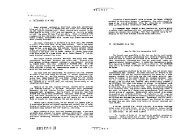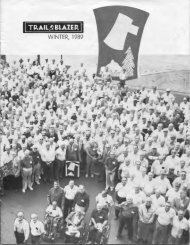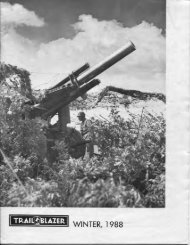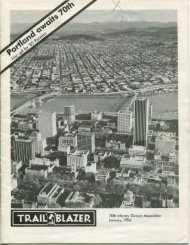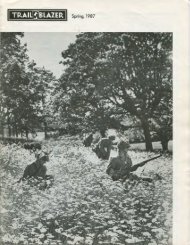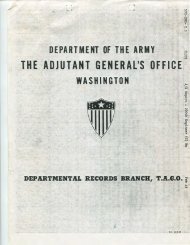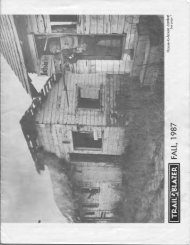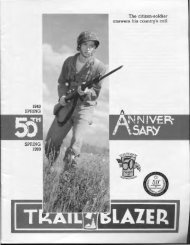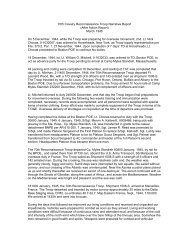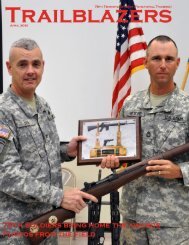Download - 70th Infantry Division Association
Download - 70th Infantry Division Association
Download - 70th Infantry Division Association
You also want an ePaper? Increase the reach of your titles
YUMPU automatically turns print PDFs into web optimized ePapers that Google loves.
The 12th was comparatively quiet. The warm sun dried the roads somewhat, while in Forbach, the paved<br />
streets were completely dry and vehicles raised clouds of dust as they went by.<br />
A prisoner of war reported that the Germans might use gas. The Commanding General ordered all men to<br />
wear gas masks. Orders by the Regimental Commander to reissue all gas masks were fulfilled by S-4 in<br />
the early afternoon of the 13th of March. The night of. the 12th found increased enemy rocket fire landing<br />
on Companies F and G. Company B received heavy enemy mortar fire during the night.<br />
A report from S-2 of the 274th that 15 Mark V tanks were lined up between houses north of Stiring-<br />
Wendel caused our S-2 to warn all forward elements of a possible enemy counterattack, but no attack<br />
materialized.<br />
According to the records, on March 13, Staff Sgt. Brubaker is promoted to Tech. Sgt. We had eight men<br />
missing, wounded or killed in action. PFC Robert Adamson was promoted to Sgt. He was a gunner for the<br />
30 Cal. machine gun and now became a squad leader.<br />
On the morning of the 13th of March our patrols contacted the enemy still in position along the railroad<br />
embankment. Two enemy patrols moved into Company B area but withdrew.<br />
Around noon, S-2 was informed that civilians reported the enemy was evacuating Petite Rosselle and<br />
withdrawing to Luisenthal.. Civilians also reported later that the Germans had left Stiring-Wendel,<br />
Schonecken, and Gersweiler.<br />
At 1130 an observer of the 1st Battalion reported that enemy soldiers in full field equipment were<br />
observed leaving Petite Rosselle. Patrols from Companies A and C were sent into Petite Rosselle with<br />
orders to hold what they took, if they met little or no resistance. Patrols from the 274th Regiment were<br />
sent into the Simon Mine area on our right to contact the enemy.<br />
By late afternoon all patrols had reported either no contact with the enemy or meeting very little rear<br />
guard action. The "Bloody Axe" Regiment was ordered to pursue the enemy in force leaving Company I to<br />
clean out Petite Rosselle. However, later reports from patrols indicated that the town was clear of enemy.<br />
Therefore, Company I was sent to Rosbruck and cleared that village. They then rejoined their Battalion<br />
which was assembling in the University area to give chase to the Germans. The 1st Battalion, marching in<br />
column, was moving after the enemy by 1925. The 2d Battalion started across the railroad embankment<br />
shortly before 2000 with Company F on the right and Company G on the left. Company E moved along<br />
the railroad northwest and west. The 3d Battalion was assembling in the University area preparing to<br />
move to Klarenthal upon Regimental order. The 101st Cavalry on our left was on the move toward the<br />
Saar River. The 274th on our right was moving to the north toward the Saar. Shortly after our Regiment<br />
started moving, the Germans jammed our radios. The Battalions had no communications with their<br />
Companies until wire was laid.<br />
It was decided to send the 3d Battalion up to the Saar behind the advancing 1st and 2d Battalions and<br />
have the 3d Battalion patrol the south bank of the Saar for possible crossing points. After the 3d Battalion<br />
was assembled, it moved out for Petite Rosselle on its way to the Saar.<br />
During the night of 13-14 March, our troops officially crossed the pre-war French-German border at the<br />
outskirts of Petite Rosselle.<br />
The anti-tank ditch at that town stopped most vehicular traffic during the night. The Engineers worked on<br />
a crossing and had great difficulty with mines which were thickly scattered all around. They suffered<br />
several casualties.<br />
On March 14 our First Sgt. Ray McCreight, was promoted to 2nd Lt. The company moved from the<br />
defensive position and launched an attack at 1930 from 1/2 mile east of Forbach, France. We now held<br />
position one mile north of Kleinrossel, Germany.



